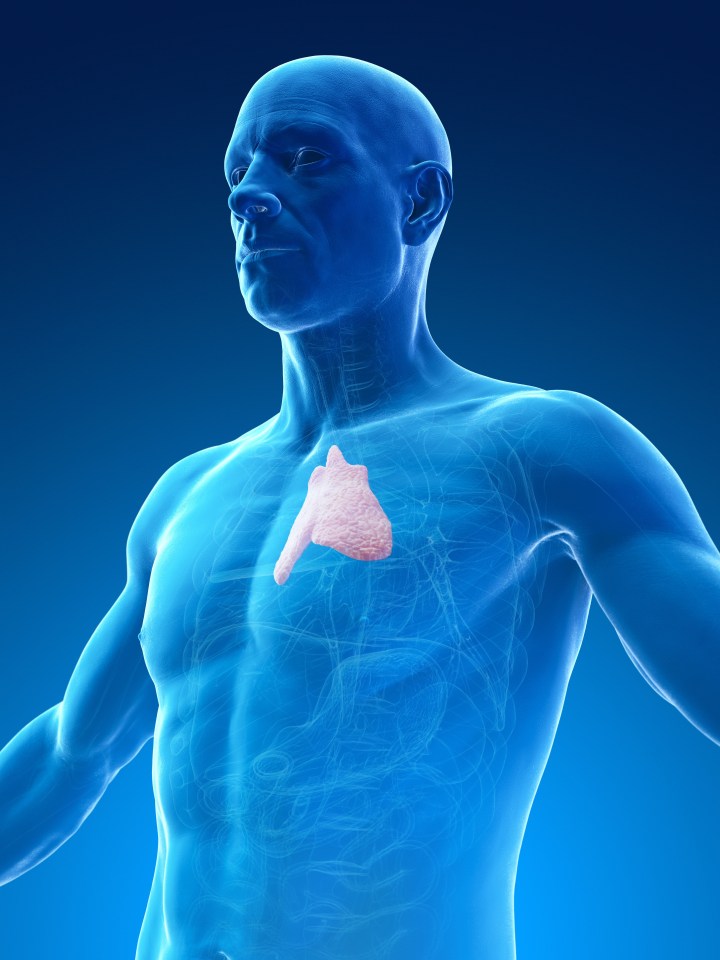‘Useless’ organ that doctors often remove could actually help you live longer and even fight cancer
BEHIND your chest wall sits a small fatty gland called the thymus.
The blob-like organ was thought to be useless in adults – until a study suggested quite the opposite.
Scientists from the US found that those who get their thymus removed face an increased risk of cancer and death from any cause later in life.
“We discovered that the thymus is absolutely required for health,” Harvard University oncologist David Scadden said when the research was published last year.
“If it isn’t there, people’s risk of dying and risk of cancer is at least double,” he added.
The study is purely observational, so it can’t prove that removing the thymus directly causes cancer or other deadly illnesses.
Read more on the thymus
Yet, with what they now know, the scientists are now arguing that preserving the thymus “should be a clinical priority” where possible.
In childhood, the thymus plays a key role in developing the immune system.
When the gland is removed early, it leads to a reduction in T-cells, a type of white blood cell that fights germs and diseases.
By puberty, the thymus shrinks and produces far fewer T cells.
It can often be removed without immediate harm, and since it sits in front of the heart, it’s sometimes taken out during heart surgeries.
Some people with thymus cancer or autoimmune diseases like myasthenia gravis need their thymus removed.
Sun Health Explainer: What is cancer?
But for many, the gland isn’t a problem and can actually be helpful.
For the study, published in The New England Journal of Medicine, researchers compared the outcomes of almost 2,000 patients who had heart surgery – some of which had their thymus removed.
Those who underwent a thymectomy were almost twice as likely as controls to die within five years.
Patients who had their thymus removed were also twice as likely to develop cancer within five years of surgery.
What’s more, this cancer was generally more aggressive and often recurred after treatment compared to the control group.
“This indicates that the consequences of thymus removal should be carefully considered when contemplating thymectomy, ” David said.
Read More on The US Sun
The reason for these associations is unclear.
But researchers believe a lack of thymus may be stopping the immune system from working properly.
From your plica semilunaris to Darwin’s tubercle – the 9 ‘pointless’ body parts you never knew existed

THERE are 78 organs in the human body, and hundreds more parts if you count individual bones, muscles and glands.
While we rely on many of them to stay alive – think heart, brain and lungs – scientists now consider some utterly pointless.
Officially called “vestigial”, these body parts have become more-or-less functionless in the course of evolution.
They may once have helped protect our ancestors, but now, they are pretty much just extra weight.
You’ll likely have heard of the ones most often removed or talked about – like wisdom teeth and male nipples.
Read here to find out about the 9 “spare parts” you probably never knew existed,.
Note: Thank you for visiting our website! We strive to keep you informed with the latest updates based on expected timelines, although please note that we are not affiliated with any official bodies. Our team is committed to ensuring accuracy and transparency in our reporting, verifying all information before publication. We aim to bring you reliable news, and if you have any questions or concerns about our content, feel free to reach out to us via email. We appreciate your trust and support!















